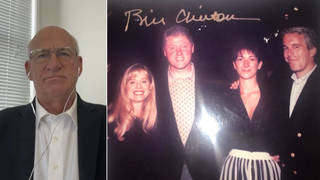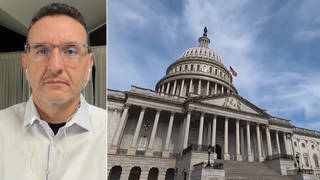
“The Republican Party has really become an extremist movement.” Amid a growing political divide in the Republican Party over the release of federal documents related to the Jeffrey Epstein investigation, we speak to former Republican political operative Stuart Stevens about the erosion of support for Donald Trump from some of his most prominent backers. Stevens traces the MAGA takeover of the Republican Party and shares how the Lincoln Project, a Republican-led anti-Trump organization where he is a senior adviser, is working to stop Trump’s anti-democratic agenda.
Transcript
AMY GOODMAN: This is Democracy Now!, democracynow.org. I’m Amy Goodman.
President Donald Trump has abruptly demolished the entire East Wing of the White House. This comes as the government shutdown enters its 24th day, with Republican majorities in Congress facing growing criticism, some of it from within the party itself. House Republican Congressmember Marjorie Taylor Greene spoke Tuesday on The Tucker Carlson Show.
REP. MARJORIE TAYLOR GREENE: I have no respect for Speaker Johnson not calling us back to Washington, because we should be passing bills. We should be passing bills that reflect the president’s executive orders, which are exactly what we voted for. We should be at work on our committees. We should be doing investigations. And you want to know something? We should be passing the discharge petition that Thomas Massie put in to release the Epstein files. …
Many times I hate my own party, and I blame Republicans for many of the problems that we have today. And I blame them for being so “America last,” to the point where they are literally slaves to all the big industries in Washington, the military-industrial complex, Big Pharma, health insurance industries, you name it. They are literally slaves to them. And they love the foreign wars so much.
AMY GOODMAN: Congressmember Marjorie Taylor Greene, a Republican, has also called for the extension of the Affordable Care Act subsidies, a key demand of Democrats to end the government shutdown. She wrote on X, quote, “I’m going to go against everyone on this issue because when the tax credits expire this year my own adult children’s insurance premiums for 2026 are going to DOUBLE, along with all the wonderful families and hard-working people in my district,” unquote.
Well, today we look at the growing fissures within the Republican Party, as Republican House Speaker Mike Johnson refuses to swear in the Democratic Congressmember-elect Adelita Grijalva of Arizona, who would be the final vote on a discharge petition to release the Epstein files. Republican Thomas Massie co-sponsored the rare bipartisan bill to require the release of the full Epstein files. So far, four Republicans have signed on: in addition to Massie, yes, Republican Congressmember Marjorie Taylor Greene, Nancy Mace of South Carolina and Lauren Boebert of Colorado, all Republicans.
Meanwhile, as Trump sends federal forces into Democrat-led cities like Chicago, the Republican governor of Oklahoma, who’s also the head of the National Governors Association, Governor Stitt, has criticized the move, telling The New York Times, quote, “Oklahomans would lose their mind” if troops were sent into their red state.
This all comes as Trump’s nominee to lead the Office of Special Counsel, Paul Ingrassia, withdrew from consideration Tuesday following widespread backlash, including of Republicans, over a slew of racist texts. He texted a group of Republicans that he has a, quote, “Nazi streak,” adding that the Martin Luther King Jr. holiday should be, quote, “tossed into the seventh circle of hell,” unquote. After the texts were made public by Politico, several Republican senators said they wouldn’t support his nomination, including the Senate Majority Leader John Thune. Vermont state Senator Samuel Douglass has just formally resigned over his comments in the chat.
For more, we go to Vermont, where we’re joined by Stuart Stevens, a former Republican political operative who worked on George W. Bush’s presidential campaign, was the chief strategist for Mitt Romney in 2012. Stevens did not support Donald Trump as the Republican candidate either time. He’s a senior adviser to the Lincoln Project and the author of nine books, including The Conspiracy to End America: Five Ways My Old Party Is Driving Our Democracy to Autocracy and It Was All a Lie: How the Republican Party Became Donald Trump. His recent essay for Zeteo is headlined “My Plea to Democrats: Stop Being Polite, Go Nuclear.” He also writes for the Lincoln [Square] Substack.
We welcome you back to Democracy Now! Thanks so much for being with us, Stuart Stevens. Is there a growing fissure within the Republican Party? Are these divisions significant?
STUART STEVENS: First of all, it’s great to be here. Thanks for asking me.
Listen, I think that what’s happening with Margie Taylor Greene is very specific to her desire to run as a statewide candidate in Georgia. And as we’ve seen, Georgia is increasingly a purple state. There’s actually a lot of suburban voters that are not comfortable with the sort of ugliness of the ICE raids, are not comfortable with the idea that the, you know, East Wing is being torn down. They’re not comfortable with the idea that Trump won’t release the Epstein files. So, she’s trying to appeal to those voters. I think it would be a mistake to make too much of these fissures, because Donald Trump has a control over the Republican Party unlike anything I think we’ve seen in modern political history.
AMY GOODMAN: So, let’s talk about the different issues — for example, the Epstein files. You have one Republican after another now joining the Democrats in demanding they be released. I mean, this week, you know, you have President Trump breaking down, demolishing the East Wing. The East Wing of the White House was the wing of the first ladies, by the way, also paving over the Rose Garden, which was put in by Jacqueline Kennedy, interestingly. But you have one Republican congresswoman after another — Mace, Marjorie Taylor Greene, Boebert — joining with Massie in demanding the Epstein files be released. Do you think more — this will happen with more? And you have this unbelievable move of the House speaker not seating an elected representative because he doesn’t want the Epstein files released — that’s what a lot of people are analyzing it as.
STUART STEVENS: Well, I think that’s an absolutely correct analysis. I mean, say what you will about Jeffrey Epstein. The guy’s dead, and he can still shut down Congress. You know, that’s pretty rare.
You know, I don’t think this Epstein files thing is really very complicated. Most of us aren’t worried about being on the Epstein files — in the Epstein files. The only person who would not want it released is someone who was worried about being in it. And that goes to Donald Trump.
And you have to grasp here, Amy, is the degree to which the Republican subculture, maybe 45, 50% of the party, has made the Epstein files, for a decade, really, to be a great cause — half. This is a part of an international conspiracy of child molesters that run a secret government, like the Illuminati, and Epstein was at the center of this. And they believe this, and it’s become sort of an article of faith. So, now you have the people who made fortunes out of becoming popular podcast hosts, like Dan Bongino, of beating the drum to release the Epstein files — Kash Patel. Now they’re in a position where they can, and they’re not doing it. So, that’s a natural tension there.
And I think it’s going to play out, and it’s ultimately going to have to be released, at least to somebody. When we talk about the Epstein files, it’s sort of: What are we really talking about? There’s such a vast trove of information, digital and otherwise, that was seized by the FBI. I don’t think we’re going to know what all of it is, but I think we’ll know more than we know now.
AMY GOODMAN: Can you talk about the ad campaign that you’re involved with, with the Lincoln Project?
STUART STEVENS: Yeah, look, the Lincoln Project, just to kind of go to the origin story, was formed by a small group of Republican consultants who felt that Donald Trump was a great threat to the country. And we looked at this, that, for better or worse, we have certain skills that we’ve developed helping to elect Republicans. Some of these Democrats don’t do as well as we do. There’s other things that Democrats do better. And our mission, really, was to appeal to a group of voters who are reluctant to support Donald Trump but need encouragement not to: soft Republicans, some of these independents and Democrats. I mean, going back to 2020, this is what Steve Bannon said, sort of famously: “If these guys can get 5 to 6% of Republicans to vote for Biden, it’s going to be a problem.” And we started calling that the Bannon line.
You know, it is our frustration of the hesitancy of the Democratic Party to be more assertive. I mean, if you step back from it, Amy, we have this lunatic president who’s supporting Russian stooges, drunks, lunatics like RFK Jr., across the government. We’re tearing down the East Wing. And we’re talking about what’s wrong with the Democratic Party? I really — how did this happen? Now, you’re talking to somebody that’s spent years pointing out flaws in the Democratic Party, but it is the only pro-democracy party in America now. The Republican Party has really become an extremist movement.
So, we’re very good in the Lincoln Project at working inside the Republican Party. We do a series of ads we call “the audience of one.” And we run it where we know Trump is going to see it, which means we buy a lot of golf channels in Mar-a-Lago and Bedminster. And he responds to it. And it’s an extraordinary ability. If you go back to Hillary Clinton, said that we shouldn’t have a president who responds to a tweet. This guy responds to everything. And we’re trying to increase those tensions, because the more that the Republican Party fights internally, the less effective it is.
AMY GOODMAN: I wanted to go to one of those Lincoln Project ads, that ran last year, about Trump’s racism against Puerto Ricans.
NARRATOR: We are Puerto Ricans, and we are Americans. But Donald Trump doesn’t see us that way. We remember what he did to us after Hurricane Maria. We were dying by the thousands while he threw paper towels at us like we were a joke, because he thinks we are garbage.
TONY HINCHCLIFFE: I don’t know if you guys know this, but there’s literally a floating island of garbage in the middle of the ocean right now. Yeah, I think it’s called Puerto Rico.
NARRATOR: We are not your punch line. We know who we are. We are proud Americans, proud Puerto Ricans. And we see who you are. You’re a racist. You are a liar. You are the one that is garbage. And we know where real garbage belongs: in the trash.
AMY GOODMAN: So, Stuart Stevens, as we begin to wrap up, your comment on this and also what’s happening in Vermont? On the one hand, you have the governor, Phil Scott, not agreeing to the whole issue of federalizing the National Guard. And then you have Sam Douglass, the Vermont state senator, being forced to step down. He resigned over racist and antisemitic comments, like referring to an Indian woman as someone who just didn’t bathe often enough. In another instance, Brianna Douglass, Sam’s wife and the Vermont Young Republicans National Committee member, saying her husband may have erred by “expecting the Jew to be honest.” Can you comment on the whole Republicans — Young Republicans scandal and what it’s done in the country?
STUART STEVENS: Yeah, you know, look, there always was an ugly side to the Republican Party. Those of us who were involved in the Bush campaign, the compassionate conservative side, we saw this dark side. I mean, literally, like, me, Nicolle Wallace, Matthew Dowd, Mark McKinnon, Pete Wehner, we used to literally sit in the same room. But I think that we thought that we were the dominant gene of the party and that the party would come our way, if only because the country was changing so much. And I don’t know any conclusion to come to but that I was wrong. We were the recessive gene. And the party now has become what the party wants.
So, you have this generation of kids that came of age, a lot of them, under knowing nothing but Trump. And this is where transgressive behavior becomes a mark of purity. And really, the Republican Party has become an extremist movement. What we know about extremist movements is it demands more and more purity checks.
So, it’s ugly. There’s much about — we don’t talk enough about race in American politics, I think. Trump’s coalition in '20 was 85% white, and the country is what? Fifty-nine percent white, and less after this show. He did a little better in the last election. It was 84% white. So, the base of Trump's support is non-college-educated white voters, which is the fastest-declining large demographic in America. And they know this, which is why they’re trying to curate the election and make it whiter and make it less educated.
And obviously, about Phil Scott, who I helped in some of his campaigns, you know, if the Republican Party had any sense, they would look at Phil Scott, who’s one of the most popular governors, if not the most popular governor, in the country, who’s a Republican in a heavily Democratic state, and they would go to him and say, “What can we learn? What can you teach us?” Because if we Republicans could carry states like Vermont or Massachusetts, where Charlie Baker was, or Maryland, where Larry Hogan — all clients of mine — were governors, we would rule the Earth. We’d always win. Instead, they’ve made these governors, like, an increasingly small number of them, like a Phil Scott — they just ignore them. So, Phil Scott did the right thing here. He said, “No, I’m not going to have somebody that is a Republican who is writing this racist stuff.” I mean, why is this even complicated?
AMY GOODMAN: Stuart Stevens, we’re going to have to leave it there, but I thank you very much for joining us.
STUART STEVENS: Thank you.
AMY GOODMAN: Former Republican political consultant, senior adviser to the Lincoln Project, writes for the Lincoln Square Substack.
Next up, a new documentary called Criminal, drawing attention to the Harris County Jail in Houston, Texas, where at least 15 people have already died this year. Back in 20 seconds.












Media Options